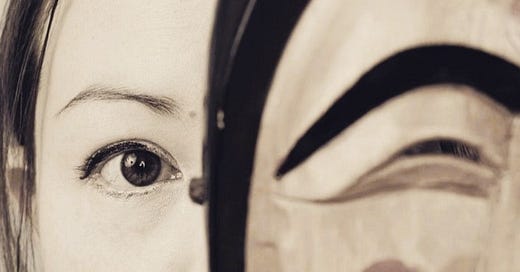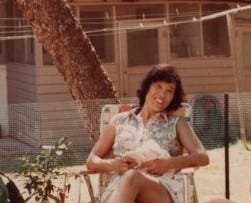K.P. Kulski │"author, historian, and career vampire of patriarchal tears"
Includes reading of her essay “100 Livers” from Unquiet Spirits on the Bram Stoker Preliminary Ballot
It’s my pleasure to share K.P. Kulski today, talented author, friend and an essayist in Unquiet Spirits, the essay collection I edited with Lee Murray. Her essay “100 Livers” from that collection is on the Bram Stoker Preliminary Ballot (along with the collection as a whole and essays by Nadia Bulkin and Lee Murray).
K.P. KULSKI is a Hawaii-born, Korean-American author, historian, and career vampire of patriarchal tears. Channeling a lifelong obsession with history and the morose she’s managed to birth the gothic horror novel, Fairest Flesh, and novella, House of Pungsu. She bartered nine years of her life to the U.S. Navy and Air Force for food and later taught college history for the captive audience. Trapped by a force field, she currently resides in the woods of Northeast Ohio where she (probably) brews potions and talks to ghosts. Find her at garnetonwinter.com.
Can you tell me a bit about your background and upbringing, including your cultural heritage?
K.P. Kulski · I’m biracial. Both sides of my family have strong connections to heritage. My mother is Korean, immigrated from Korea in the 70s to the U.S. My father is a New Englander (self-described Mass-hole) of mostly Polish and Irish (and other European heritages) descent. The first five years of my life I spoke Korean at home, although I’ve lost the ability to speak it now. During those first 5 years, I spent a lot of time with my mom and that side of my family… aunties and cousins. I also have three older half-brothers who grew up in Korea from my mother’s first marriage. They were all adults by the time I was born.
My mother died when I was young, an event I discuss more in my Unquiet Spirits essay, “100 Livers.” After her death things really changed on a lot of levels, including culturally. My father was military, so we moved a lot. When he got orders and we moved, he purposefully cut off communication with my mom’s family so they didn’t know where we were. One of my brothers even tried to visit before we left, flying into town to see me, but my dad left him stranded at the airport.
So almost overnight everything changed. My paternal grandmother came to take care of me. Both my father and grandmother were passively racist. I didn’t grow up with slurs but my difference as an Asian child in their white world was always an issue, a mark of what they considered flawed about me. For example, my grandmother called me, “sneaky” throughout my childhood, which baffled me and caused a lot of pain and self-doubt. It wasn’t until I was an adult I realized it was a racialized idea and nothing to do with who I am as a person. She was physically abusive. My father was emotionally abusive and manipulative. It was a hard and very lonely childhood where I was often isolated.
How do you navigate the balance between preserving your cultural heritage and integrating into the larger society?
K.P. Kulski · Intention is vital. For a long time I didn’t feel I had the right to my Korean heritage because sometimes I pass as white. Further, I lost my mother and with her my language and much of my culture. After having children of my own, I became determined to give them as much of their Korean heritage as I could. I want them to know they have the right to own their heritage no matter what anyone says. Other people don’t get to dictate that.
I’ve dug deep into memories. I’ve been blessed with retaining a good amount of early memories. Oddly enough much of it resurfaced after becoming a mother where I found myself using a few Korean words (that I didn’t even fully realize I remembered) when correcting them and in other contexts. I’ve learned how to make many Korean dishes. I’m always learning and rediscovering things almost forgotten in my memories. They surface like gems in response to the scent of Korean dishes and even hearing Korean spoken. It’s easy to stay submerged in the dominant parts of American society, but I’ve found I’m incomplete when I’ve done that. A vital part of me goes missing. I have to pursue situations to give my soul a chance to remember. Korean food, language, history, and thinking about my mother, all are things I intentionally pursue. Subsequently, doing this has given me… myself, in a way I’ve always needed.
Can you share some experiences or challenges you've faced related to your cultural identity in your personal or professional life?
K.P. Kulski · It’s a constant guess if my Korean heritage is noticed when I walk into just about any situation. I suppose it’s a 50/50 chance LOL. What I know is that it seems to matter a lot in my interactions with others and sometimes it can determine how people interact with me. It can get awkward if it’s “discovered” or realized during the course of an interaction, so there are times I’ll choose to mention it, to put it out there to get the potential awkwardness over with. In worst situations, the most awkward ones, people will dance around it, this is most often white people. It’s like they detect something and have to root it out. They’ll ask me questions like, “what’s your surname?” “your maiden name?” “where are you from?” etc. It really frustrates them when I give my super Polish surname, haha. Of course, there are times I’m stubborn about it and act like I can’t imagine what they’re trying to get at.
But when I really think it about the whole thing, I realize it’s all strange because it’s given me a front row seat into knowing two distinct realities— what it’s like to walk around white and what it’s like to walk around Asian in America. It’s a startling contrast. I find assumptions I am white gives me easier access to spaces, like there’s more room for me. When I am seen as Asian, a lot becomes about my race and how I look. Comments from people telling me if I’m Asian enough, or not Asian enough, about the darkness or lightness of my hair color, paleness of my skin, how they have a friend who is Asian, how I should talk to the other Asian family in town. This includes treatment and statements inferring exoticism, and racial fetishism.
What’s even more challenging—never knowing what people see when I walk into a room. A person or an Asian person. It’s fucked up that this dichotomy exists at all.
With all this said, I want to express that being able to pass is an advantage and you can see from my description above, when I do, I get a lot of privilege. When I don’t pass, well… yeah… my childhood was plenty full of kids pulling the corners of their eyes and calling me names, of a womanhood plenty full of men asking me about my private parts and saying, “me love you long time.” Although, all the violence I’ve experienced concerning my race has been unfortunately from people who were from my white family.
What are some aspects of your culture that you wish more people understood or appreciated?
K.P. Kulski · Omg, how I wish people understood and saw the resilience of the Korean people. Just look at the modern history of the Peninsula and see how we’ve gone through hell and come back stronger. Not because we went through hell, but despite it. On top of that, I wish Americans associated Korean women with strength because racist ideas about Korean women are not only insulting but so far from reality. Those of us who are part of or around Korean women know how absolutely strong and fierce we are. To us, Korean women are downright legendary, especially older Korean women. My god, they are steel. When I hear racist stereotypes repeated about Asian women being subservient or passive, it not only infuriates me but makes me roll my eyes so hard. The Korean women in my life are some of the strongest people I’ve ever met. And bold. And occasionally terrifying, hahaha.
What advice would you give to someone interested in learning more about your culture or building cultural understanding?
K.P. Kulski · Respect the kimchi. For real, I know for a lot of people it’s a new in vogue health food but for Koreans it’s more than just a food. For goddess’s sake, please don’t try to own it by believing and acting like you’re an expert on kimchi. You’re handling something that is more than food. It might sound odd to some but if you look at Korean history, you’ll understand we’ve had a history of taking what little things we have in tough times and turning them into something good and practical. Kimchi is a great symbol of that spirit. Also, many of us have strong memories tied to and surrounding kimchi. It’s quite hard to articulate why one should treat it with respect, but it’s important. It’s not that kimchi sacred, but it’s pretty dang close.
Also, good on you if you learn Korean, but if you aren’t of Korean descent or grew up in Korean culture, you aren’t Korean. Moreso, it doesn’t make you more Korean than someone who is either of Korean descent or grew up in Korean culture whether or not they speak Korean themselves or look Korean “enough” to you. Get away from trying to own a culture that is not your own. Appreciate it, learn about it, work on languages, but understand it’s not your rosebush to pluck. But you certainly can admire how resilient, rich, and beautiful Korean culture and history can be because it really is all that.
Is there anything else you would like to share about yourself or your culture that we haven't covered?
K.P. Kulski · I wanted to take the opportunity to drop some links to some of my favorite Korean Diaspora creators and thinkers for others to explore.
As promised in the video reading, here’s a link to Shaman Seo’s Morning Calm Oracle Deck. If you’ve ever followed any photos of books I’ve done, there’s been many times I’ve slipped one of the cards into the photo to represent beautiful concepts that mean a lot to me and symbolize my work. 🔗https://shamanseo.com/morning-calm-oracle-cards/
Artist Shirley Jackson (talk about an awesome name!) has become one of my absolute favorite visual artists and I regularly save up money so I can pick up something from her fabulous shop. She does everything from wood block art, enamel pins, and pottery. 🔗https://lioninthetrees.com/
Artist Stella Im Hultberg. I will forever stare longingly at her work. 🔗https://www.stellaimhultberg.com/
Jess Cho’s poetry and fiction will forever move me. I can’t communicate well enough just how gorgeous and full of silver threads of magic their words are. 🔗https://semiwellversed.wordpress.com/
Thank you, Angela for the chance to talk and share!
And now, please enjoy K.P. Kulski speaking about and reading from her essay “100 Livers” from Unquiet Spirits.








